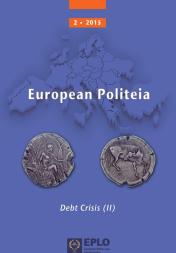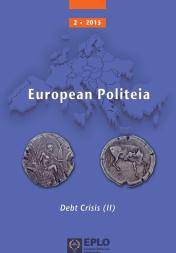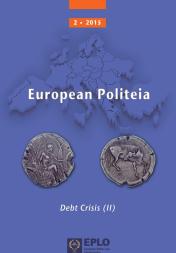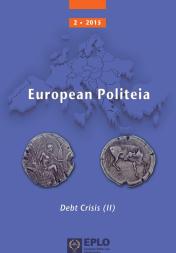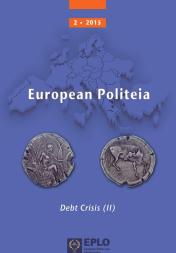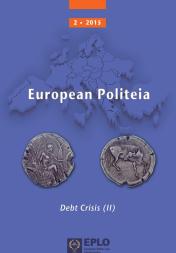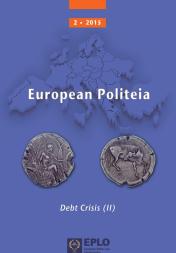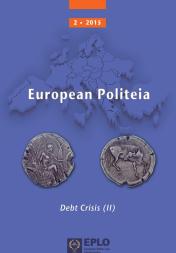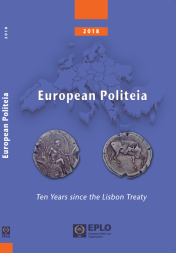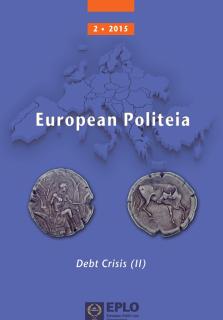
European Politeia 2/2015
In the second volume of European Politeia for 2015, the focus is once again on the enduring Greek debt crisis, which has been exacerbated by an unconsidered implementation of austerity measures combined with failed efforts to alleviate burdens of state and society and with a political instability that further hinders any idea of investment in the Greek economy. The volume addresses particular aspects of legal, economic and political practice while tackling broader issues likely to shed light on underlying factors of the crisis as a prerequisite of any effective remedy. In the process, we get a better understanding of the European governance under which we are bound to live.
The first issue of this Journal contained two accounts which systematically surveyed the avalanche of the economic and legislative measures which were taken in the context of the EFSF assistance programme for Greece. As previously announced, the section "Praxis" of the present issue of the Journal contains an account which illustrates the reaction of the judiciary to such measures. Theodora Ziamou, Judge at the Greek Council of State, presents a short overview of the "crisis jurisprudence" of the Greek Council of State aiming particularly at setting out the extent of the judicial application of constitutional principles in times of crisis - a crisis that is not only a crisis of the economy, but also a crisis of the law and of the legal institutions known so far (Controlling the Legislator's Intent in the "Crisis Jurisprudence" of the Greek Council of State). Apart from that, the issue at hand features contributions spanning a diverse range of legal and political questions with a special focus on the Greek crisis and its effects. Professor emeritus Nikos Scandamis (Qu'en est-il de la démocratie face au néo-libéralisme? La dette souveraine en termes de gouvernance européenne) presents the ways in which the Greek case illustrates the interaction of the parliamentary democracy of the Member States and the democracy between States on a transnational level, particularly between the States that comprise the Eurozone. Manolis Perakis (The Passive Form of Judicial Activism: Judicial Self-restraint while Balancing Fundamental Rights and Public Interest in the Age of Economic Crisis) and George Karavokyris (Constitution and Necessity in Times of Crisis: An Alternative Way of Understanding the Complicated Relation between Law and Politics) both focus on the stance of the national and international judiciary towards the question of infringement of fundamental rights by the governmental austerity measures during the Greek crisis under the light of the similar concepts of "state of emergency" and "necessity", thereby addressing the issue of the relation between politics/ governance and the law. Katerina Pantazatou and Michail Rodopoulos' joint article (A "Typus" as an Appropriate Legal Tool for the Interpretation of the "No Bail-out" Clause: The 'Private Investor Principle') presents the academic debate on the interpretation of Article 125 TFEU both from the standpoint of the CJEU and that of the Bundesverfassungsgericht. Georgios Poulakos (Quelle autonomie fiscale pour la zone euro?) addresses the enhancement of a legal frame of fiscal consolidation after the adoption of the "Two Pack" (Regulations 472/2013 and 473/2013) taking a critical approach to various attempts undertaken to determine a model of conduct for Member States, related to both their power to design national tax legislation and their right to levy funds by recourse to loans.
PROLEGOMENA
Editor's Note: Again or Still?
THEORIA
Nikos Scandamis, Qu'en est-il de la démocratie face au néo-libéralisme? La dette souveraine en termes de gouvernance européenne
Manolis Perakis, The Passive Form of Judicial Activism: Judicial Self-restraint while Balancing Fundamental Rights and Public Interest in the Age of Economic Crisis
George Karavokyris, Constitution and Necessity in Times of Crisis: An Alternative Way of Understanding the Complicated Relation between Law and Politics
Katerina Pantazatou / Michail Rodopoulos, A "Typus" as an Appropriate Legal Tool for the Interpretation of the "No Bail-out" Clause: The 'Private Investor Principle'
Georgios Poulakos, Quelle autonomie fiscale pour la zone euro?
PRAXIS
Theodora Ziamou, Controlling the Legislator's Intent in the "Crisis Jurisprudence" of the Greek Council of State
Xénophon Yataganas, L'affaire de la radiotélévision grecque (ERT). Aspects juridiques et politiques
Dimitrios Pyrgakis, Judicial Review over Public Television's Closure (Greek Council of State Decision 1901/2014, in Plenary Session)
Anastassios Banos / Xénophon Yataganas, Le problème des régimes salariaux spéciaux devant le Conseil d'Etat hellénique
Zoi Theodorikakou, Arrêt 2307/2014 du Conseil d'Etat hellénique (Assemblée Plénière)
Theodora Ziamou, Omission of the Administration to Readjust the Tax Value of Immovable Property (Greek Council of State Decision 4003/2014, in Plenary Session)
VARIA
Xénophon Yataganas, La signature de l'accord du 20 février 2015 sur la prolongation du contrat d'emprunt est-elle illégale?















